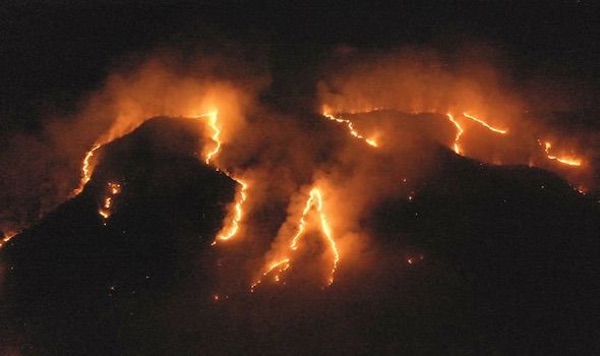
Tierra Curry, a senior scientist at the US Center for Biological Diversity, on the race to save the Amazon (for The Hill).
In Brazil, the Amazon rainforest is now burning at a record rate.
The greedy, short-sighted policies of Brazil’s far-right President Jair Bolsonaro are jeopardising indigenous peoples and countless plants and animals. Indeed, in the midst of a climate emergency, Bolsonaro’s policies to slash environmental protections and develop the Amazon for mining, ranching and farming jeopardise the future of life on Earth as we know it.
North America has already lost nearly 300 species to extinction. The toll in the more-diverse tropics like the Amazon is unimaginable.
The Amazon not only harbours much of the Earth’s cultural and biological diversity, it plays a major role in oxygen production, carbon dioxide balance and the water cycle. It is a living library of pharmaceuticals and anthropological treasures.
The fires and increasing deforestation in the Amazon ― with cattle ranching for beef exports to the United States as a primary driver ― will have disastrous consequences for biodiversity and will accelerate global climate change.
When I was 17, someone said the hamburger I was eating was contributing to the destruction of the rainforest because of the slash-and-burn agriculture for imported beef. I laughed at them and kept enjoying my burger. But then I looked it up and, like many people my age, became obsessed with “Saving the Rainforest.”
I cut my environmental teeth learning about tropical deforestation in the 1990s. Twenty-some years later, the imperative to save this critically important forest is greater than ever.
As a conservation biologist I’ve seen so much beauty in the world, but the splendor and wonder of the jungle never ceases to amaze me.
We have everything to lose.
Early mornings in the Amazon, kingfishers swoop from snags overhanging the water, blue morpho butterflies flicker along the banks. Two species of dolphins surround our boats. Sloths saunter deeper into the forest and bats call it a night and disappear into the shadows.
Toucans sit quietly on the tree branches. These vibrant birds with their absurd beaks really aren’t just a picture decorating a cereal box.
Sleeping is nearly impossible as potoos and owls compete with innumerable insects to fill the night with sounds. Patches of the forest floor really do glow at night, just like in the movie “Avatar.”
More kinds of monkeys than I can count scamper through their morning routes, keeping an eye out for harpy eagles. Underfoot, overhead and all around, life here pervades every nook and cranny and seeps into my very soul.
As a senior scientist at the Center for Biological Diversity, I’ve been fighting for years to protect endangered species. Now I’m fighting for the Endangered Species Act itself.
This week the Center and allies challenged the Trump administration’s attempt to gut the Endangered Species Act. New regulations would weaken protections for endangered and threatened species to make it easier for commercial and industrial development to destroy their habitats.
These frightening new rules come as more evidence mounts to show we’re in the midst of an extinction crisis. Scientists agree that more than 1 million plants and animals are at risk of disappearing because of changes humans are making as we go about our lives without consideration for the other beings we share the planet with.
The rampant fires in the Brazilian Amazon are the latest heartbreaking, and infuriating, example.
The United States and the international community must double down on solutions to curb accelerating deforestation. This is a matter of climate justice and human rights that transcends the boundaries of countries.
So, what can we do?
People can help by contacting their members of parliament and demanding action. They can support organisations that work to protect indigenous communities, curb deforestation and fight extinction. And they can raise awareness of this tragedy so that more people are inspired to take action.
The only unacceptable answer is to do nothing.
![[Irish Republican News]](https://republican-news.org/graphics/title_gifs/rn.gif)
![[Irish Republican News]](https://republican-news.org/graphics/title_gifs/harp.gif)

